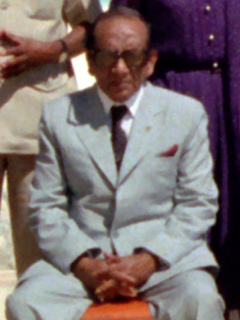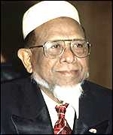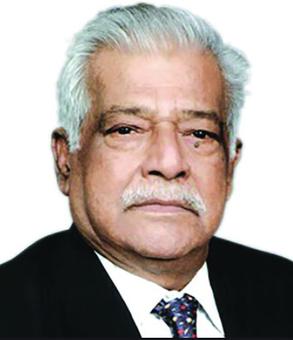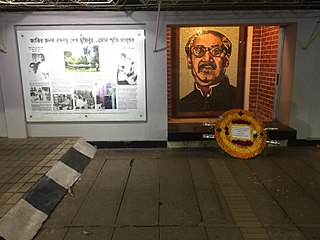
Sheikh Mujibur Rahman, popularly known by the honorific prefix Bangabandhu, was a Bangladeshi politician, revolutionary, statesman, activist and diarist. As a politician, Mujib had held continuous positions either as Bangladesh's president or as its prime minister from April 1971 until his assassination in August 1975. Mujib successfully led the Bangladeshi independence movement and restored Bengali sovereignty after over two centuries following the Battle of Plassey in 1757, for which he is honoured as the "Father of the Nation" in Bangladesh who declared independence. In the 2004 BBC opinion poll, Mujib was voted as the Greatest Bengali of all time.

Abdus Sattar was a Bangladeshi statesman. A leader of the Bangladesh Nationalist Party (BNP), he served as the president of Bangladesh from 1981 to 1982, and earlier as the vice president. A jurist by profession, Abdus Sattar held numerous constitutional and political offices in British India, East Pakistan and Bangladesh. He was a cabinet minister, supreme court judge, and chief election commissioner.
Shah Azizur Rahman was a Bangladeshi politician who served as the prime minister of Bangladesh. However, he was the subject of considerable controversy for his collaboration with the Pakistan Army against the struggle for the independence of Bangladesh.

Abdus Samad Azad was a Bangladeshi diplomat and politician. He was elected to Bangladesh's parliament five times from 1970 to 2001. He was also elected Member of Lower Assembly in the Parliament of the then East Pakistan. He became President of the Muslim Student Federation of All - Asam in 1946 and led the Language Movement in 1952.

Moudud Ahmed was a Bangladeshi lawyer and politician. He was a standing committee member of Bangladesh Nationalist Party. Ahmed was elected as a Jatiya Sangsad member total five times from Noakhali-1 and Noakhali-5 constituencies.

Abdur Rahman Biswas was a Bangladeshi politician. He was the President of Bangladesh from 1991 to 1996. Biswas represented Pakistan at the United Nations General Assembly prior to the independence of Bangladesh.

Muhammad Mansur Ali was a Bangladeshi politician who was a close confidant of Sheikh Mujibur Rahman, the founding leader of Bangladesh. A senior leader of the Awami League, Mansur also served as the Prime Minister of Bangladesh in 1975.
Jail Killing Day is observed by the Awami League (AL) of Bangladesh and many other political organisations on 3 November every year. It commemorates the killing of four Awami League and national leaders: former vice-president Syed Nazrul Islam, former prime minister Tajuddin Ahmed and Captain (Rtd.) Mansur Ali, and former home minister A H M Quamruzzaman on this date in 1975.

Ataur Rahman Khan was a Bangladeshi lawyer, politician and writer, who served as the chief minister of East Pakistan from 1 September 1956 – March 1958, and as the prime minister of Bangladesh from 30 March 1984 to 1 January 1985.

Fazlul Quader Chowdhury was a Bengali politician who served as the 5th speaker of the National Assembly of Pakistan from East Pakistan. He belonged to Ayub Khan's Convention Muslim League. He was also the acting president of Pakistan from time to time when Ayub Khan left the country. His elder brother Fazlul Kabir Chowdhury was the leader of the opposition in East Pakistan assembly. Quader was preceded by Maulvi Tamizuddin Khan of Awami League.
Comilla Victoria Government College is a government college in Comilla, Bangladesh. It is one of the oldest and most renowned colleges in Comilla as well as in the Chittagong division. The college is located beside of Ranir Dighi on 32 acres of land including its intermediate and honors section.

Barishal Zilla School, popularly known as BZS, is a public educational institution for boys, located in Barisal, Bangladesh. It was the first high school established in Barisal Division. Founded as Barisal English School on 23 December 1829 by W. N. Garrett, it began with 27 students. In 1853, the school was renamed Barisal Zilla School.

Mustafizur Rahman Siddiqi was a Bangladeshi entrepreneur, politician and diplomat. He set up a number of manufacturing and finance businesses during the 1960s. He played a prominent role in the Bangladesh Liberation War of 1971, organising resistance within Bangladesh and travelling to the US to represent the Bangladesh Government in exile. He became Minister of Commerce and Foreign Trade in the newly formed state, and ambassador to the US and Mexico.
Mahbub Ali Khan was a Bangladesh Navy rear admiral and the chief of naval staff from 1979 until his death in 1984. He is known for his heroic actions for his country. Under him, the South Talpatti sandbar and other emerging islands in the Bay of Bengal, over which both India and Bangladesh claimed sovereignty, remained under the authority of Bangladesh. He is also known for reducing piracy in the Bay of Bengal and was responsible for maintaining the security of the Bay and the Sundarbans.
Mustafizur Rahman was a Bangladeshi Army general who served as the Chief of Army Staff of the Bangladesh Army from December 1997 until 23 December 2000.

Khandakar Mohammad Obaidur Rahman was a Bangladeshi politician. He was a member of the Jatiya Sangsad in 1973 representing Bangladesh Awami League and in 1979, 1996 and 2001 representing the Bangladesh Nationalist Party (BNP).
Mir Shawkat Ali, Bir Uttom was a general in Bangladesh Army and also a politician of the Bangladesh Nationalist Party. He was a freedom fighter during Bangladesh Liberation War and a sector commander of the Mukti Bahini. He was the state minister of food, and cabinet minister of labour and manpower. He was a war hero and awarded the Bir Uttom for his contribution during the Bangladesh liberation war.

Abdul Haleem Chowdhury was a Bangladesh Nationalist Party politician, Member of Parliament, and government minister. He is a retired captain of Pakistan Army and fought in the Bangladesh Liberation War. His son-in-law is Mafizul Islam Khan Kamal.

The 15 August 1975 Bangladesh coup d'état was a military coup in Bangladesh launched by mid-ranking army officers on 15 August 1975. The officers were part of a conspiracy to assassinate founding president Sheikh Mujibur Rahman, whose administration post-independence grew corrupt and authoritarian until he unscrupulously established a one-party state led by the socialist BaKSAL. Mujib, along with his resident family members, were killed during the coup but was survived by his two then-expat daughters, one of them being future prime minister Sheikh Hasina. The officers were led by Capt. Abdul Majed, Maj. Syed Faruque Rahman, Maj. Khandaker Abdur Rashid and Maj. Shariful Haque Dalim.
Mohammad Ziauddin, BU is a retired Bangladeshi military officer, who was the Commanding Officer of the 1st East Bengal Regiment during the Bangladesh Liberation War. He was awarded the Bir Uttom, the country's second highest gallantry award for his outstanding bravery in the Liberation War. His certificate number was 22.












